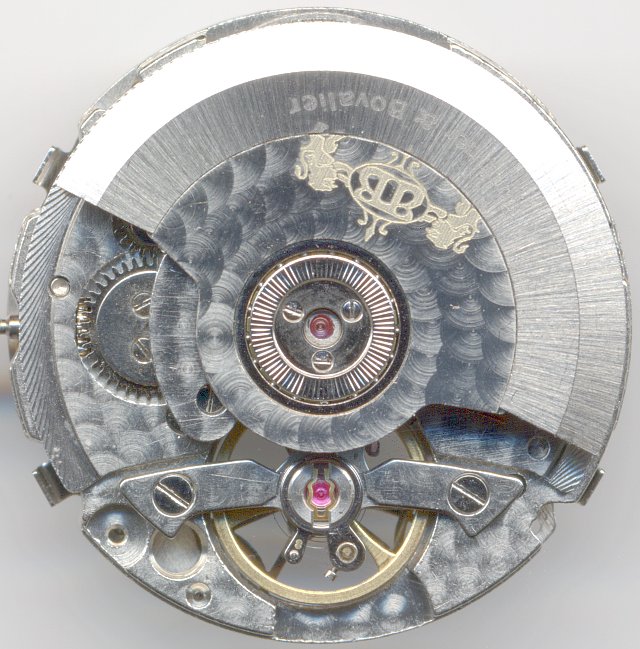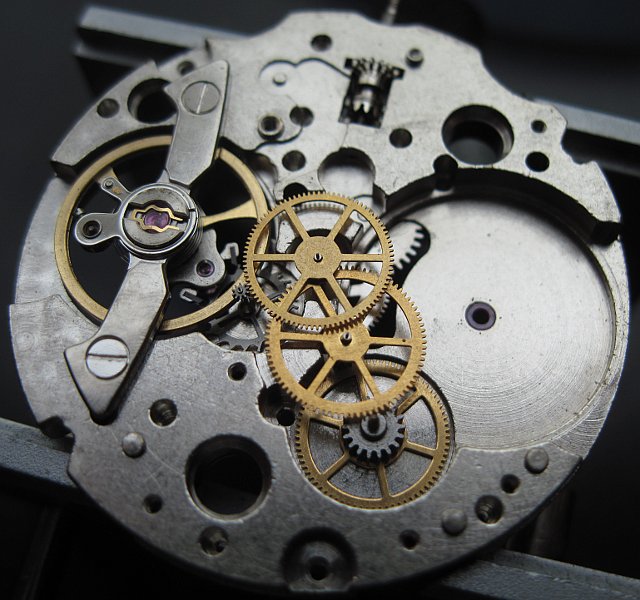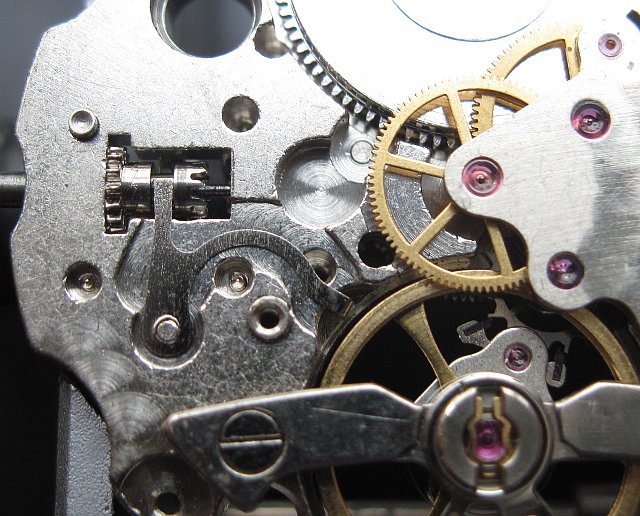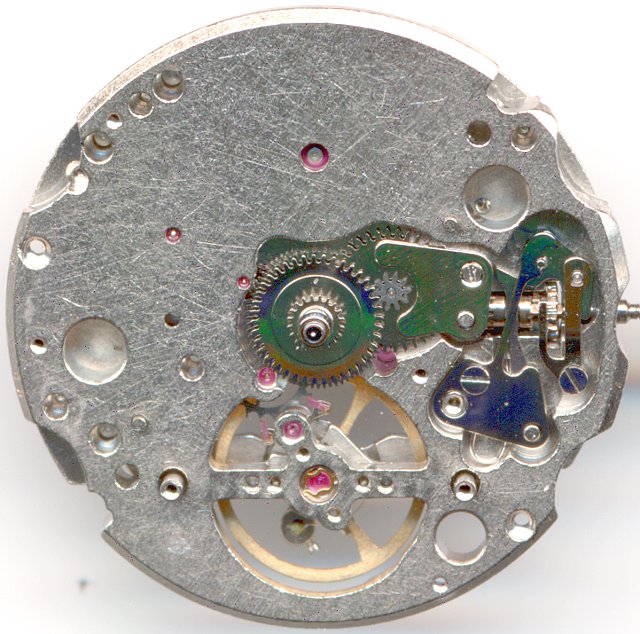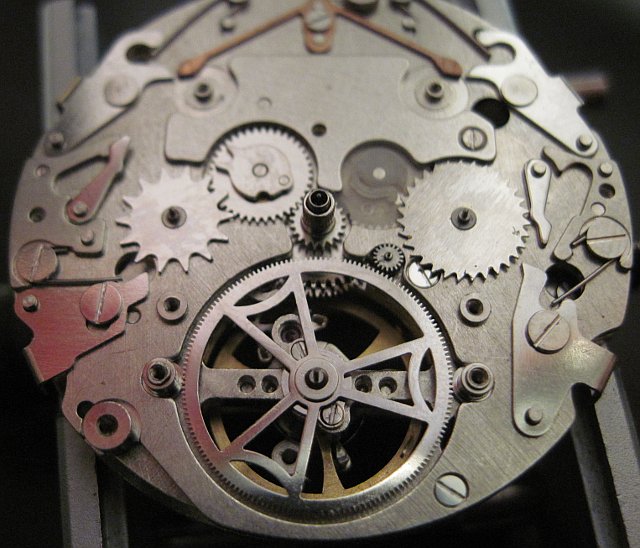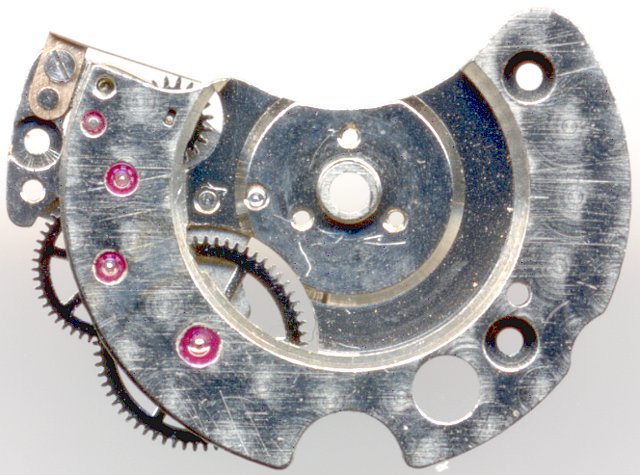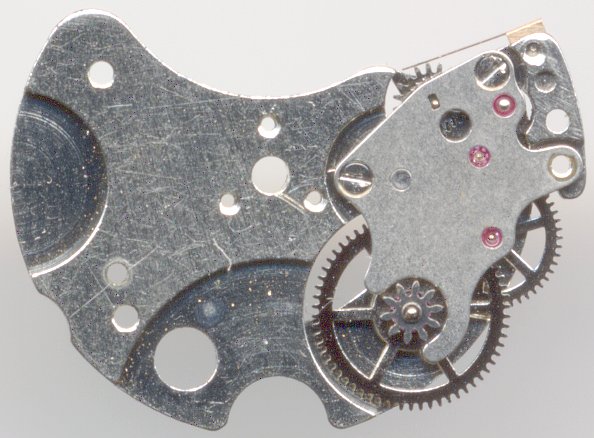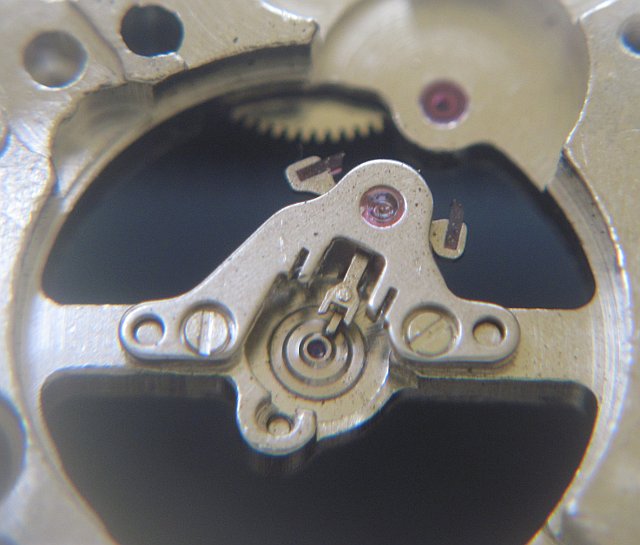Description
The Sea-Gull 2503 is a chinese selfwinding movement with manual full calendar, visible balance and Tourbillon lookalike. According to Chinese Watch Industry Wiki it is part of the “Premium Line”, to the best movements, made by Sea-Gull.
Unlike most other chinese movements, it is decorated at the visible parts, with a stripes decoration at the outer part of the gear bridges and with a perlage decoration on the remaining surfaces. The perlage decoration is only at the surface and far less deep, than on decorated swiss movements.
In terms of equipment, it scores with a day-date indication and with a full calendar (month and year), which must be advanced manually, tough. To this and further, sometimes a bit scary, equipment details, later.
Base movement
The main plate is rather thick; its center element is the open balance, whose bearings are mounted on a bridge, together with the bearing of the lever. The rest of the movement, which has got a modern design with directly driven center second and indirectly driven (at the dial side) hands, is completely equipped with rubies. As generally on movements with open balance, the insertion of the lever is a challenge, which required lots of patience.
The three-leg balance (probably made of Glucydur, as the shape indicates) is beared in two Incabloc-like shock absorber bearings and beats with the unusual number of 23.400 A/h. Originally, it was planned to use a beating frequence of 28.800 A/h, but due to technical reasons [4] this could not be achieved, and so some modifications on the gears were made to allow that semi-fast beating rate.
A useful detail of this movement is the hacking function, which is achieved by a tiny spring, that presses gently against the balance ring, when the crown is pulled into its third position. This mechanism is state-of-the-art and can be found in many swiss movements, too.
The surface of the gear bridge is decorated with a light perlage, except the non-visual part, which is covered by the selfwinding mechanism. At “1:30”, you see the ruby bearing of the selfwinding pinion, and at “12 o’clock” the (technically superfluous) ruby bearing of the mainspring barrel.
On the dial side, at 10 o’clock there’s the pinion for the minute wheel, and at “4:30”, there’s a slot for another pinion, which drives the tourbillon lookalike (or decentral second hand) at 6 o’clock.
Full calendar
The ST2503 uses a manual full calendar with indicators for day, weekday, month and year, where the last two ones can only be advanced manually with pushers. Technically it would have been rather easy to increase the month when the day switches beween 31 and 1 (just a Valjoux 7751 does), and to increase the year, when the month disc switches from december to january. It’s a pity, because with the only manual advancement, the movement somehow seems incomplete, which is against the claim of this movement to be a part of the better Sea-Gull movements.
Weekday (left) and day (right) are indicated by two hands. Both indicators advance slowly over many hours, but also have got two(!) different quickset mechanisms at the same time: First by pressing the pushers at “8” (weekday) or “4” (day), second by turning the time back and forth a few hours, the plasic disc with its flexible finger ensures, that the date is not set back when the time is set back, thus allowing the date to be set forward only by turning the hands back and forth. Interestingly, the weekday on contrast, can be set back by turning the time back.
A deeper sends of this addition of quickset mechanism is unclear to me, maybe different teams worked at the date mechanism at the same time …
At the bottom, you see a second gear(!), which is driven by a pinion a 4 o’clock, and which shall give the illusion of a turning tourbillon cage. Besides the sense of nonsense of that gimmick, it is a technically good solution, since all gears and pinions are ruby-beared and the large gear shows no signs of statis unbalance and so does not decrease the rates of the movement. In theory, it would be possible to add a hand and so show decentral seconds.
The construction (if you even will call it so) of the year and month discs is a little shirtsleeved: The painted sheet plate is just sticked onto the switching gear! With the slightest forces, it will come off! Pretty bad and prone to fail!
The uppermost balance bridge is just ornament. Together with the large second wheel, the illusion of a rotating tourbillon cage should be generated.
Selfwinding mechanism
The selfwinding mechanism visually reminds of a mixture of the ETA 2824 (round plates) and the ETA 2892 (oscillating weight with large ball bearing and gear). Technically, there’s not much of ETA, since the mechanism of the ST2503 only winds unidirectionally; on the counter side, the oscillating weight is decoupled by a slipping gear (see the longish bearing at 10 o’clock).
The oscillating weight is ball-beared on the inner side and has got a large bearing, which is pretty loud, but eliminates problems with bevelling due to worn-off or not accurately fitting bearings.
The winding mechanism of the movement is a bit odd, since there are two different decoupling mechanism at the same time responsible for decoupling the movement when the crown is turned backwards:
First, there’s the usual breguet clutch and second, the last transmission gear (at 6:30) is slipping beared (see the ellipse-shaped bearing) and slips off, when turned backwards. It also a rather common mechanism, but the use of two different decoupling mechanism is definitely unusual. No idea why, and maybe it’s also not useful to think too much about it…
Manufacturing and quality
So much has already been written about the quality of chinese movements, mostly with negative undertones.
The ST2503 shown here is not outstanding in terms of quality, but it’s not bad either. The construction is, except a few oddities, absolutely OK and up-to-date. But a watchmaker will soon recognise the bad manufacturing of the screws: Their heads are so flat, that it is very difficult to to find a hold with a screw driver and not to slip off. On the picture above, you can see, that the slots are very wide and flat. Due to this, it’s difficult to really fix the screws, and sooner or later, they will slip off and stop the movement.
Another noteable thing, if the balance works, which is a bit rough. The balance is pretty thick without fine finishing, the hairspring is pretty inelastic and prone to magnetism. On the specimen shown here, it was not possible, to demagnetize the hairspring!
If Sea-Gull would invest a bit into the balance works, their movement would achieve higher precision and longevity.
Technical data
| Manufacturer: | Sea-Gull |
| Caliber: | ST2503 |
| Size: | 13 1/2''' |
| A/h: | 23400 |
| Number of jewels: | 29 |
| Escapement: | Pallet lever |
| Balance types: | Glucydur anular balance |
| Shock protection(s): | China (different types) |
| Balance bearing / direction hairspring: | Bridge |
| Moveable stud: | yes |
| Adjust mechanism: | Hairspring key |
| Construction: |
|
| Construction type: | solid construction |
| Winding mechanism: | yoke winding system |
| Features: |
|
| Production period: | 2000- |
